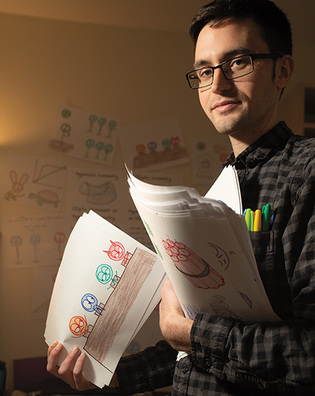 loading
loading
Where They Are NowMath for the massesFormer teacher and “terrible artist” Ben Orlin ’09 expands his reach through his blog and new book Math With Bad Drawings.  Mark OstowAfter seven years as a classroom math teacher, Ben Orlin ’09 turned to teaching through blogging; his Math with Bad Drawings blog, now also a book of the same name, is one way he’s trying to reach students who might not otherwise appreciate math’s “intrinsic beauty.” View full imageWhen math major Ben Orlin ’09 decided he wasn’t suited for a career in higher education, he turned instead to teaching his subject to middle- and high-schoolers. After seven years, he retired from teaching—but he’s still an educator, via his popular blog, Math with Bad Drawings. (Yes, they are bad. But kind of charming, for stick figures.) Last year, the blog spawned a book, Math with Bad Drawings: Illuminating the Ideas that Shape Our Reality (published by Black Dog and Leventhal). If Orlin’s name sounds familiar, it may be because you’ve heard of his much-debated 2015 essay in the Los Angeles Times, on interviewing college applicants to Yale. We asked him about that and about his idiosyncratic approach to teaching math. Yale Alumni Magazine: In 1992, the famous educator Teen Talk Barbie spoke for many of us when she said, “Math class is tough.” But it wasn’t for you. Ben Orlin: I grew up in a very mathematical world. My dad’s a math professor at MIT, my sister’s a math teacher, and I’m married to a research mathematician [Taryn Flock ’09]. I always enjoyed the subject, and my high school teacher created a rich and intense experience, which continued at Yale with Yair Minsky and other professors. I thought teaching would be a way to use my background and make myself useful. Y: For many students, Barbie’s assessment is right. Why put kids through the ordeal? O: First, because math is useful and practical for dealing with lots of real-world tasks, and second, because it has an intrinsic beauty—it’s a lovely collection of puzzles we should applaud for their own sake and try to understand. Y: In your classroom, how did you try to make math more than, as you said in the book, “a weight-lifting stunt” or a “protracted exercise in résumé building?” O: I worked on telling stories and creating experiences that I hoped would be coherent and interesting—that would impart technical skills as well as give everyone a new perspective on mathematics. Of course, you never achieve complete success, so effective pedagogy requires a lot of humility. Y: The same might be said of interviewing college applicants. You resigned, you said in the L.A. Times, because it drove you crazy “to be the face of a process that’s unpredictable, opaque, and (at least 94 percent of the time) disappointing.” O: Every student I talked to was absurdly good—the central casting idea of the successful Yale student—including one in England who was fluent in programming, practiced molecular gastronomy, started a charity with 800 volunteers, and played in the Birmingham symphony. He didn’t get in. None of the students I talked to was accepted, and I soon realized that I would rather spend my waking hours involved in a non–zero-sum game. Y: Where did the idea for the drawings come from? O: Math is an intensely visual endeavor, but I’m not going to pretend that I’m anything other than a terrible artist. Still, math can be very frightening for most people, so leading with an area of obvious incompetence can put a class and a book audience more at ease with you and the subject. Y: Do you have any artistic influences? O: What I do is so low to the ground that I’m not sure you could call it art. But I have followed XKCD—by pioneering stick-figure web comics writer and illustrator Randall Munroe—and Saturday Morning Breakfast Cereal by Zach Weinersmith. Y: Any notion of trying to up your artistic game? O: I’m planning to return to the classroom as soon as I finish a new book about calculus. While I may have to get a master’s degree, the idea of going to art school has never crossed my mind.
The comment period has expired.
|
|